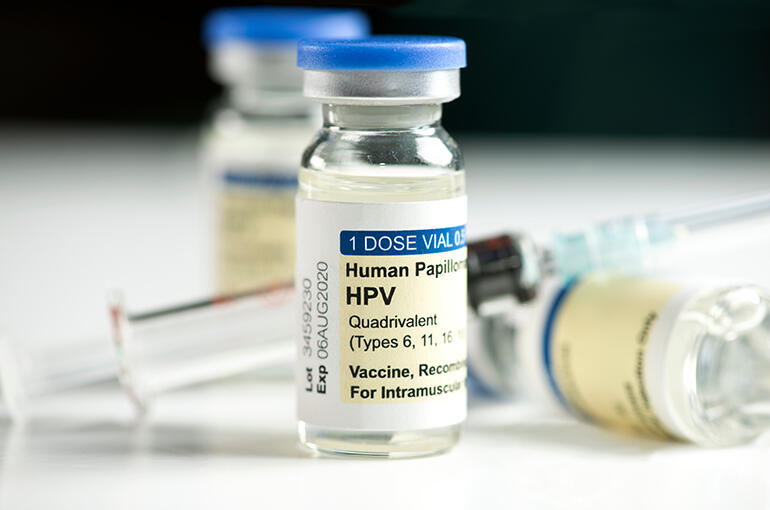- FR
- EN

Once one of the most deadly cancers among American women, cervical cancer mortality has dramatically dropped, thanks to medical breakthroughs including screening tests, better protection, advanced medical treatments and, most recently, the introduction of Human Papilloma Virus (HPV) vaccinations.
January is Cervical Health Awareness Month. In 2021, approximately 14,480 new cases of invasive cervical cancer were diagnosed, and more than 4,000 women are estimated to die from the disease in the US, according to the American Cancer Society. Once one of the most deadly cancers among American women, cervical cancer mortality has dramatically dropped, thanks to medical breakthroughs including the screening tests (Pap test, ThinPrep Pap test and HPV tests), better protection, advanced medical treatments and, most recently, the introduction of Human Papilloma Virus (HPV) vaccinations.
HPV Vaccines
HPV, a group of more than 200 viruses that are common in humans, is a single cause of cervical cancer. After scientists discovered this fact in the 1970s, a long quest to develop and commercialize vaccines to combat the virus was launched. In 2006 vaccines for reducing HPV were introduced after years of design and testing.
The vaccine is proven to be highly effective – more than 98% of recipients develop an antibody response to vaccines one month after completing a full vaccination series, according to the Centers for Disease Control (CDC). It is also effective in preventing other cancers such as vaginal, vulval, anal, oropharyngeal and throat cancers, since HPV is strongly linked to their causes. The vaccine is highly beneficial across genders and ages. Often overlooked, it is equally important for boys to get vaccinated as HPV causes gender-neutral cancers.
To secure the maximum benefit from the HPV vaccine, it is crucial to start early and follow a specific schedule. This vaccination is not effective for those who are already exposed to HPV, so it is critical to get vaccinated early. The CDC recommends HPV vaccine be given to both boys and girls at age 11 or 12 (the schedule can be started as early as age 9), in a series of either two or three doses with a specific dosage schedule. The American Committee on Immunization Practices also recommends vaccination for everyone through age 26, if not adequately vaccinated when younger, but not for those who are older.
The HPV vaccination rate in the US is moderate compared to global rates. The proportion of youths who have received at least one HPV vaccine dose was 75% in 2020, according to JAMA. Still, 51% of adolescents have not completed the HPV vaccine series, leaving them not wholly immune to HPV. This is not a good result compared to other countries like Australia, where the rate is much higher and where cervical cancer is set to become rare by the end of the 2020s (refer to SCOR Australia’s report for more details).
Disruption by COVID-19 and Public Concerns on Vaccination
There's no question that the COVID-19 pandemic has negatively affected our lives and health. HPV vaccination is no exception. As a result of the decline in routine wellness visits during the pandemic, adolescents with public insurance have missed an estimated one million doses of the HPV, a 21% dip over pre-pandemic levels, according to an estimate by Memorial Sloan Kettering Cancer Center. The magnitude of the negative impact of this reduced vaccination rate on the US population is still unknown, but it is a concerning trend.
There is another headwind against HPV vaccination. Although not in the same magnitude as the recent debate over COVID vaccination for adolescents and children, parental hesitancy towards HPV vaccination is becoming a growing issue. According to National Cancer Institute, more parents are citing concerns about the vaccine’s safety. A study showed that the percentage of parents who declined the HPV vaccine for their kids due to safety concerns went up from 13% to 23% between 2015 and 2018. Top reasons include “safety concerns,” “lack of knowledge” and “not necessary or not recommended.”
Parents’ hesitation to HPV vaccination is not US-specific. HPV vaccination rates in some countries like Japan and France remain low as they experienced strong public concerns and mistrust regarding the safety of the vaccines.
Reasons behind parental objections to vaccines can be multiple and complex. Dr. Regina Rosace, SCOR’s Medical Director, lists perceived or real concerns on vaccine efficacy, fear, unawareness, lack of trust in authority figures and religious or moral objectives as major nonmedical parental objections to vaccines in her article An Unvaccinated Child.
Conclusion
Cervical cancer has become a preventable disease, thanks to the introduction of the HPV vaccine and advanced cancer screenings driven by dedicated professionals. In the near future, life insurance companies may see fewer needs for underwriting considerations and claims related to this disease.
Yet obstacles such as the pandemic, public fear and lack of understandings are disrupting the path to victory. The quest to achieve a cervical cancer-free world and reduce mortality risk is not complete yet. Public education, improved healthcare accessibility, demystification of vaccine safety by health and wellness ecosystem players including healthcare providers and insurers will be powerful drivers to achieve a cervical cancer-free society.
References
- Daniel et al. Impact of reduced human papillomavirus vaccination coverage rates due to COVID-19 in the United States. https://pubmed.ncbi.nlm.nih.gov/33875269/
- Cancer.gov Despite Proven safety of HPV Vaccines, More Parents Have Concerns. https://www.cancer.gov/news-events/cancer-currents-blog/2021/hpv-vaccine-parents-safety-concerns
- Sonawane, Lin, Damgacioglu et al. Trends in Human Papillomavirus Vaccine Safety Concernsand Adverse Event Reporting in the United States. https://jamanetwork.com/journals/jamanetworkopen/fullarticle/2784272
- Carlson, Robert. HPV Vaccination Rates in France: An Example of Information Mistrust https://www.vaxbeforetravel.com/only-19-16-year-old-women-france-were-hpv-vaccinated-2016
- Noman. The history of the HPV vaccine. https://www.nomancampaign.org/post/the-history-of-the-hpv-vaccine